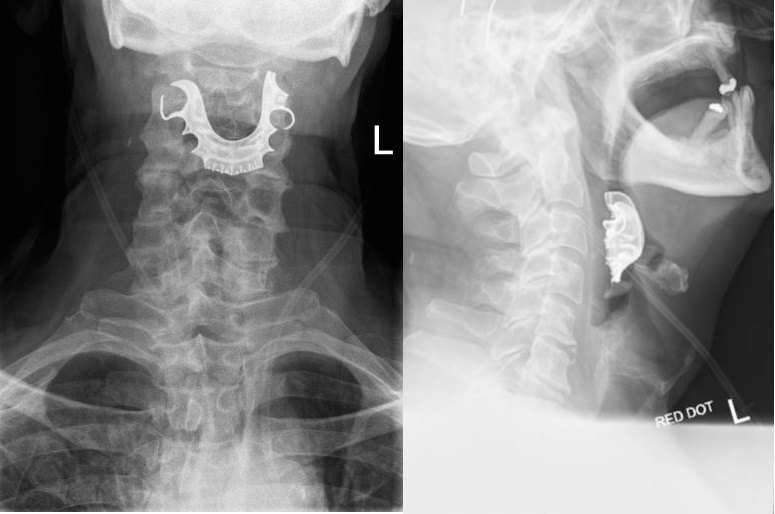A Man's Dentures Were Stuck in His Throat for More Than a Week
The case highlights the dangers of leaving dentures in a patient's mouth during surgery.

A U.K. man's dentures fell down his throat during surgery and were stuck there for more than a week before they were discovered, according to a new report.
The case highlights the dangers of leaving dentures in a patient's mouth during any surgery that requires general anesthesia, according to the report, published today (Aug. 12) in the journal BMJ Case Reports.
The 72-year-old man had undergone surgery to remove a harmless lump in his abdominal wall tissue, the report said. Six days after the surgery, he went to the emergency room (ER) with symptoms including pain in his throat, difficulty swallowing and a cough that produced blood. He told doctors that he hadn't been able to swallow any solid foods since his surgery. [11 Weird Things People Have Swallowed]
At first, based on results from a chest X-ray, doctors thought the man had a respiratory infection. They didn't find any problems with his throat on an initial examination, and they suspected his pain was a side effect of having a tube down his throat during surgery. Doctors prescribed the man antibiotics and sent him home.
But two days later, the man was back in the ER. His throat pain was worse, and he was still coughing up blood. His voice was hoarse, and he told doctors he hadn't been able to swallow any of the medications they had given him. The man was also feeling short of breath, particularly when lying down.
He was admitted to the hospital, and doctors suspected he had a severe chest infection. But when they performed a procedure to look at his throat and voice box,
Sign up for the Live Science daily newsletter now
Get the world’s most fascinating discoveries delivered straight to your inbox.
they saw a metal, "semicircular object" lying across his vocal cords that had caused swelling and blistering.
When doctors told the man what they saw, he mentioned that his dentures had been lost during his surgery. This prompted doctors to perform an X-ray of the patient's neck, which revealed the missing dentures — consisting of three false teeth attached to a metal roof plate — stuck in his throat. The man had apparently inhaled, or aspirated, his dentures during the surgery.
He underwent emergency surgery to remove the dentures and was released from the hospital six days later.
But that wasn't the end of the man's medical saga. Over the next several weeks, he returned to the hospital four times with bouts of bleeding in his throat and coughing that produced blood. Doctors eventually discovered that the man had a torn artery in his neck near the area where the dentures had caused tissue damage. He needed another emergency surgery, along with several blood transfusions. Six weeks later, the man appeared to be healing well and didn't need to return to the hospital.
This isn't the first case of it's kind. Earlier this year, a report in the journal Case Reports in Surgery described a 50-year-old man in Turkey who apparently swallowed his dentures during sedation before surgery. And a 1976 report in the journal Anesthesia & Analgesia described the case of a patient in Austria who died after inhaling dentures when a breathing tube was placed down the individual's throat.
There are no national guidelines on how dentures should be managed when a patient undergoes anaesthesia for surgery, according to Dr. Harriet Cunniffe, an otolaryngologist at James Paget University Hospitals NHS Foundation Trust in Great Yarmouth, United Kingdom, and author of the new report.
Some hospitals allow dentures to remain in place while the anaesthetic is being infused but remove them before placing a tube in the patient's mouth.
In general, the "presence of any dental prosthetics should be clearly documented before and after any [surgical] procedure," Cunniffe wrote in the report.
Cunniffe also stressed that doctors should "listen to the story the patient is telling you." In the current case, the man's initial test results suggested a respiratory infection, but such an infection would not typically explain the man's throat pain and difficulty swallowing. In other words, doctors should have continued to consider other diagnoses that would explain more of the man's symptoms.The results of the chest X-ray ended up acting "as a distraction" from the real diagnosis, Cunniffe said.
Originally published on Live Science.

Rachael is a Live Science contributor, and was a former channel editor and senior writer for Live Science between 2010 and 2022. She has a master's degree in journalism from New York University's Science, Health and Environmental Reporting Program. She also holds a B.S. in molecular biology and an M.S. in biology from the University of California, San Diego. Her work has appeared in Scienceline, The Washington Post and Scientific American.









